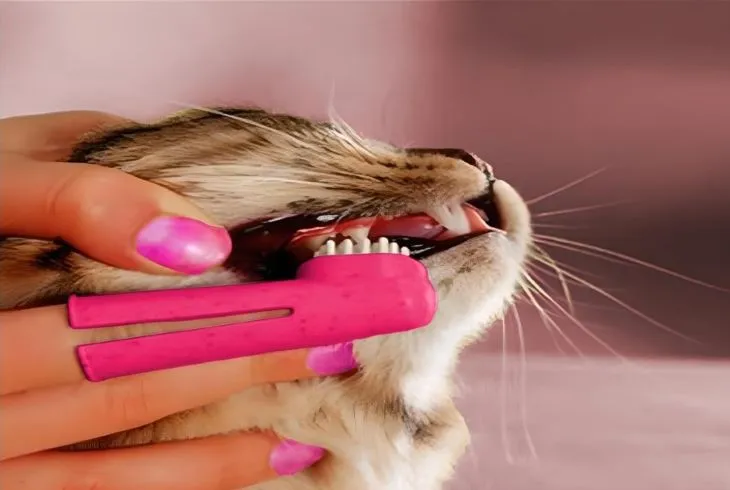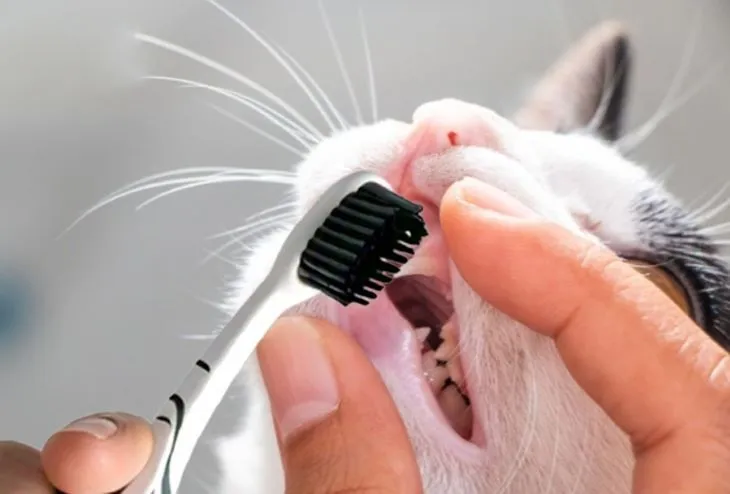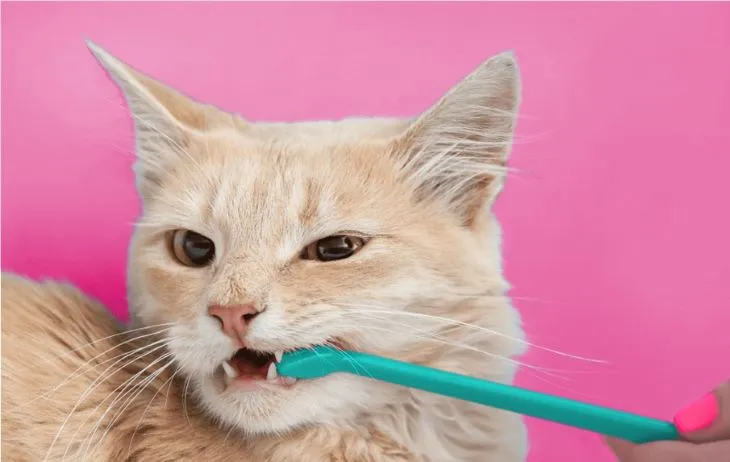Cat Dental Cleaning – Essential Tips To Keep Your Feline’s Teeth Healthy
Cats are natural groomers, but did you know their dental health needs extra care? Regular teeth cleaning is essential to prevent dental diseases like tooth decay, gum issues, and plaque buildup. Just like us, cats can suffer from serious health problems if their teeth aren’t properly cared for. Keep your feline friend healthy with routine dental hygiene!
By: Elizabeth Rikas

The information in this article is intended to educate cat parents and is not a substitute for veterinary guidance. In case of any concerns about your cat’s health, please talk with your veterinarian.
According to a report by the Cornell Feline Health Center, 50% to 90% of cats over four years start to get different diseases related to their teeth. As cats are naturally good at hiding pain, many cat owners don’t realize that their cats have a problem with their teeth. Regular cat dental cleaning is crucial for maintaining your feline friend’s overall health and well-being.
If you’re unsure about cat dental disease, its signs, and how to properly clean your cat’s teeth, don’t worry—I’ve covered everything in detail. Keep reading to learn more!
Click to Read: Why do cats gag?
Why Cats Need Dental Cleaning?
Cats are prone to developing dental issues due to their diet and natural habits. Here are some reasons why cat dental cleaning is necessary:
Plaque And Tartar Buildup
As cats eat, food particles and bacteria accumulate on their teeth, forming a sticky film called plaque. If the sticky stuff (plaque) on your teeth is not cleaned off, it can harden and turn into crusty deposits (tartar).
Tartar is tougher to remove than plaque. It can also make your gums red and swollen (inflamed) and cause holes (decay) in your teeth.
Gum Disease
When tartar builds up along the gum line, it can cause gingivitis, an early stage of gum disease. If red and swollen gums (gingivitis) are not treated, it can worsen and turn into a more serious gum disease called periodontitis, which can lead to tooth loss.
Bad Breath
When a cat’s breath smells bad, it usually means something is wrong with their teeth. The buildup of plaque and tartar can cause an unpleasant odor, which can be a sign that your cat needs dental cleaning.
Other Health Issues
If a cat has problems with its teeth, it can affect other parts of its body, too. Issues can arise in their kidneys, heart, and even their blood sugar levels. Keeping your cat’s teeth clean and healthy can prevent them from becoming seriously ill.
Signs Your Cat Needs Dental Cleaning

It’s not always easy to tell if your cat needs dental cleaning, but there are some signs to look out for:
- Bad breath
- Drooling or difficulty eating
- Pawing at the mouth or face
- Red or swollen gums
- Yellow or brown buildup on teeth
If you observe any of these signs, it means your cat needs their teeth cleaned.
Click to Read: Kitten not drinking water
How To Clean Your Cat’s Teeth At Home?

While professional cat dental cleaning is the best way to keep your cat’s teeth healthy, there are some things you can do at home to help maintain their dental health:
Brushing
Brushing your cat’s teeth is the most effective way to remove plaque and prevent tartar buildup. Use a soft-bristled toothbrush and cat-friendly toothpaste to gently brush your cat’s teeth. Start slowly and reward your cat with treats to make the experience positive.
Dental Treats And Toys
You can buy special treats and toys for cats. These will help keep their teeth clean and fresh. Look for products that are specially designed to remove plaque and tartar, and give them to your cat as a reward or as part of their regular diet.
Dental Diets
Some cat foods are designed to help keep teeth healthy. These special foods can prevent plaque and tartar buildup on teeth and may also contain ingredients to freshen your cat’s breath. Ask your veterinarian if one of these tooth-friendly foods is suitable for your cat.
Interesting Read: Fever Coat In Kittens
Professional Cat Dental Cleaning
While at-home dental care is important, it’s not a substitute for professional cat dental cleaning. Your veterinarian can provide a thorough cleaning that removes plaque and tartar from above and below the gum line. Here’s what to expect during a professional cat dental cleaning:
Anesthesia
Cats need to be under general anesthesia for dental cleaning to ensure their safety and comfort. Your veterinarian will perform a pre-anesthetic exam and blood work to make sure your cat is healthy enough for the procedure.
Scaling And Polishing
When the pet doctor cleans your cat’s teeth, they will use special tools. These tools scrape off the sticky plaque and crusty tartar from the teeth. After that, they will make the teeth smooth and shiny. Smooth teeth don’t let the bad germs stick as easily.
X-Rays And Extractions
In some cases, your veterinarian may recommend X-rays to check for hidden dental problems. If some of the cat’s teeth are very sick or broken, the pet doctor might need to take those teeth out. This stops the sickness from getting worse in the cat’s body.
Recovery
After the pet doctor cleans the cat’s teeth, the cat will need to rest for a little while. This is because they were given sleep medicine (anesthesia) to keep them still during the teeth cleaning. The cat will feel sleepy for a bit until the sleep medicine wears off.
Your veterinarian will provide instructions for caring for your cat during this time, including what to feed them and how to manage any pain or discomfort.
Frequently Asked Questions
Conclusion
Keeping your cat’s teeth clean is essential for their overall health and well-being. Brush your cat’s teeth regularly at home, provide special dental treats and toys, and take them to the veterinarian for occasional professional cleanings. These steps will help your cat stay happy and healthy for years to come.

About the Author
Elizabeth Rikas
Elizabeth is a passionate advocate for feline health and well-being, drawing from her years as a dedicated pet parent to three cats—Gypsy, Swan, and Alfred—and her invaluable experience volunteering at animal shelters. A seasoned writer with a lifelong love for cats, Elizabeth began sharing her insights in her teens and has since contributed extensively to platforms focused on feline care. Through her expertise and heartfelt dedication, she empowers pet owners with practical advice and research-backed knowledge to nurture their furry companions.
